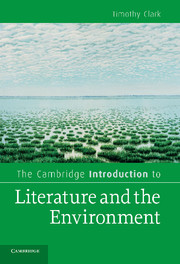Book contents
- Frontmatter
- Contents
- List of illustrations
- Preface
- Acknowledgements
- Introduction
- Romantic and anti-romantic
- The boundaries of the political
- Chapter 7 Thinking like a mountain?
- Chapter 8 Environmental justice and the move ‘beyond nature writing’
- Chapter 9 Two readings
- Chapter 10 Liberalism and green moralism
- Chapter 11 Ecofeminism
- Chapter 12 ‘Post-colonial’ ecojustice
- Chapter 13 Questions of scale
- Science and the struggle for intellectual authority
- The animal mirror
- Notes
- Further reading
- Index
- Cambridge Introductions to …
Chapter 8 - Environmental justice and the move ‘beyond nature writing’
Published online by Cambridge University Press: 05 June 2012
- Frontmatter
- Contents
- List of illustrations
- Preface
- Acknowledgements
- Introduction
- Romantic and anti-romantic
- The boundaries of the political
- Chapter 7 Thinking like a mountain?
- Chapter 8 Environmental justice and the move ‘beyond nature writing’
- Chapter 9 Two readings
- Chapter 10 Liberalism and green moralism
- Chapter 11 Ecofeminism
- Chapter 12 ‘Post-colonial’ ecojustice
- Chapter 13 Questions of scale
- Science and the struggle for intellectual authority
- The animal mirror
- Notes
- Further reading
- Index
- Cambridge Introductions to …
Summary
From the texts covered so far in this book a reader might not guess one of the most distinctive features of the environmental crisis. All across the world groups of people have come together outside the normal frameworks of politics to protest local outrages or environmental threats. The Indigenous Environmental Network, for instance, is ‘A network of Indigenous Peoples empowering Indigenous Nations and communities towards sustainable livelihoods, demanding environmental justice and maintaining the Sacred Fire of our traditions.’ Together with the proliferation of various non-governmental bodies, such movements now form a kind of cosmopolitan politics, its actions and concerns unconfined to the boundaries of the nation state.
The environmental crisis, Ulrich Beck argues, is itself inherently a delegitimation of traditional political structures:
In terms of social politics…the ecological crisis involves a systematic violation of basic rights, a crisis of basic rights whose long-term effect in weakening society can scarcely be underestimated. For dangers are being produced by industry, externalized by economics, individualized by the legal system, legitimized by the natural sciences and made to appear harmless by politics. That this is breaking down the power and credibility of institutions only becomes clear when the system is put on the spot, as Greenpeace, for example, has tried to do.
- Type
- Chapter
- Information
- Publisher: Cambridge University PressPrint publication year: 2011



